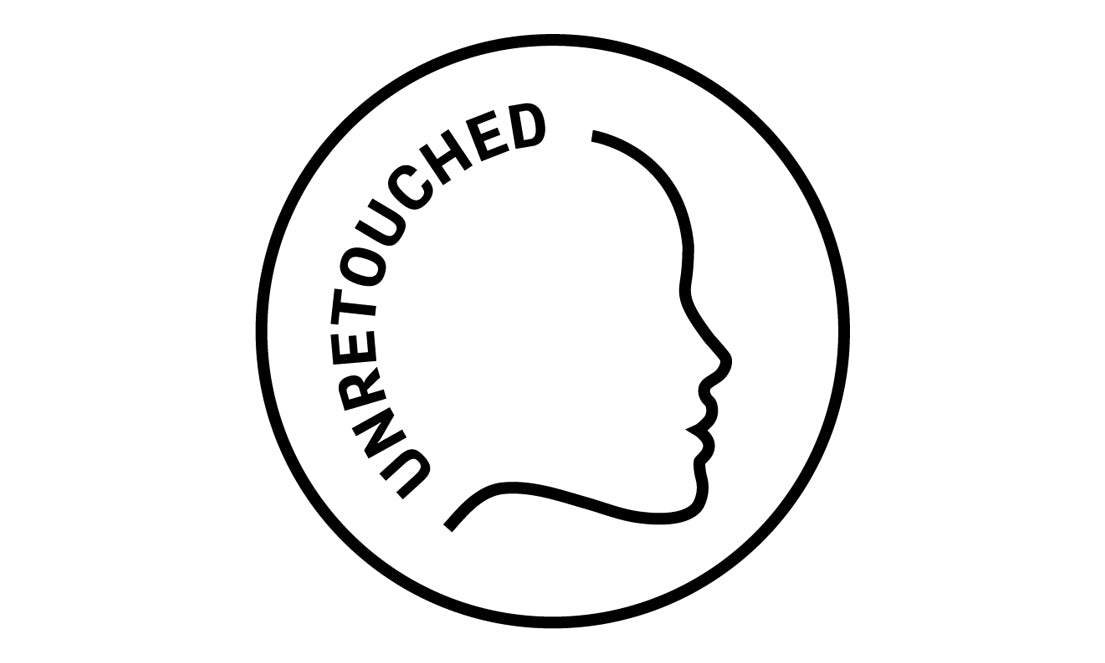Your world has never been more visual.
Whether it's a video or a photo, hardly a minute of your day goes by without you being surrounded by images. All the more so if you have an account on social media platforms like Instagram, TikTok and the like. Even more so if you actively publish pictures there yourself.
And no less so when posters, digital ads, TV commercials or simply the advertising from a magazine have an effect on you.
Perhaps you have noticed it yourself: the abundance of photos can be overwhelming. And all too often it can make you feel insecure. Especially when the photo focuses on flawless beauty.
As part of the shooting campaign for "The Glow Naked", the face cream for sensitive skin, This Place decided to make a statement: against retouching photos; for more pure skin.
In this article you will learn
and
For pure beauty: why This Place rejects Photoshop and filters
Just be honest with yourself: How many hours a day do you look at photos and videos? How long do you dive into the virtual parallel world of Instagram, YouTube, TikTok or LinkedIn?
According to various studies, we spend hours just browsing on social media platforms. In Germany, between 1 ½ and 2 hours a day are not uncommon [cf. 4; 5].
Maybe you are right on average here; maybe above, maybe below. However, the exact duration is not necessarily important.
Rather, the questions are: What are you watching? What are looking at? How do you feel while looking at pictures and watching videos? And how do you feel afterwards?
Because, frighteningly, what is supposed to be entertaining and a stimulating exchange is often the ideal breeding ground for feelings and thoughts. And they are of that kind that should germinate neither in the head nor in the heart: envy, insecurity and frustration. Not to mention diminished self-esteem or increased self-doubt [6; 7].
Distorted to the point of grotesqueness: This Place rejects these image edits
As a self-care and beauty brand that is in constant communication with its community - with you - on Instagram, Facebook and even TikTok, we are all too aware of the influence of images.
As part of the summer shoot for The Glow Naked, our face cream for sensitive skin, we talked to you about dealing with sensitivity in all its forms. And sensitivity - as well as awareness of sensitive issues - is something we want to show not only with the appropriate words, but rather with the appropriate actions.
During the August 2022 shoot, countless close-ups were taken of the face and skin of our The Glow Naked ambassador Jassica Reif. And with them in This Place Art Director and Photographer, Jeff Fenoy, the desire to show you that all This Place photos are taken without
- Photoshop
- filters
- otherwise digital retouching or post-processing that alters the original shape, appearance or proportion of the body part or person shown.
"It has been 'normal' for far too long for models to have their appearance, their proportions, altered to the point of the unnaturally grotesque. Then in 2014, a major US fashion company spoke out publicly against photoshopping for the first time.
Since then, something has definitely changed in the fashion world. Many models look more diverse than before. And yet: a look at social media and advertising alone is enough to realise even today, 8 years later: Filters continue to obscure reality," says Jeff Fenoy [1; 2; 3]. And this applies to "private" selfies as well as to numerous posts on corporate accounts.
Many photos show body shapes that can never be achieved naturally
After many years behind the camera, Jeff knows the most common shooting touch-ups in the industry a little too well: "The use of image editing software like Photoshop is often aimed at digitally altering reality, actually manipulating it to fit an artificially created ideal of beauty. This is understandable. Because by emulating such an ideal, products sell."
Of course, it can always happen during a shoot that minor background details are overlooked or that a strand of hair sticks out. "But when whole areas are cut out and placed as a stamp motif over unwanted parts of the picture, when the appearance of skin and skin texture is digitally retouched or even the complete body shape is changed, then we are moving in a realm far outside of reality. And so much further away from what can be achieved naturally," says Jeff Fenoy.
No question: as a company that relies on the power of nature, this kind of editing is unacceptable for This Place. To represent this understanding even more clearly to the outside world, Jeff Fenoy has designed a symbol to mark unretouched images for you to recognise.

This Place's Unretouched symbol: our mark of pure beauty
"I designed a clear, simple symbol to signify that our images are not digitally retouched or otherwise heavily manipulated. In doing so, the "unretouched" shapes the area where our brain is. Because I want that message to stick in people's minds."
And he emphasises the rejection of Photoshop work. Only minor adjustments such as exposure and white balance to bring out the contrast between foreground and background and careful corrections to ensure photo sharpness are unavoidable, he says. Of course, this applies above all to the people in the pictures.
Photos should show reality, not made-up fantasy
"For me, it is a must that pictures retain their photographic integrity and authenticity. And I think it is necessary to talk openly about image editing in post-production. But from my point of view, true-to-life images should become standard. I hope that in the future there will be no need for watermarks to indicate photographic integrity. And that objectivity becomes the norm in visual communication, not some fantasy concocted by the industry. Photos need to be as realistic as possible!" demands Jeff Fenoy.
Using filters? Sure. For coffee, water or long lists. Otherwise it’s all about skin positivity
The results of our exclusive survey on skin positivity in Germany provide another weighty reason to refrain from filtering.
A total of 1000 women and men responded to questions on the subject of skin feeling, beauty, caring cosmetics and the effects on their self-confidence.
Among other things, it was revealed that every 4th woman feels ashamed when skin blemishes such as redness, pimples and impurities are visible. One in three described themselves as unattractive.
As a brand for holistic self-care, we would like to encourage you to take a loving, clearly positive look in the mirror. Because we are convinced that filters are something that can serve you well over a cup of coffee or a glass of water as well as over long Excel or product lists in online shops. When it comes to you, your skin, your appearance and your self-worth, we want to remind you not to be put off by edited images - and thus make your own mark for pure skin matter.

